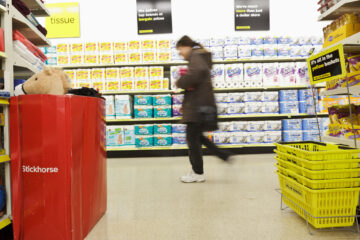If you’ve taken a trip to your local grocery store recently, you’ve probably felt more than a little overwhelmed by all the changes.
Before you even set foot into one of the (ostensibly glitzy and new) entrances, you probably noticed that parking was a little bit harder.
Related: Massive sports retail chain suddenly closing 50 stores
Most grocery stores have now installed new parking systems, whereby customers who opt to drive up and pick up their groceries are prioritized.
And the rest of us who still shop the old fashioned way have to go to the back of the line (or lot, in this case).
That’s because drive-up customers have already paid for their goods. They’re guaranteed sales, and stores prioritize their convenience to turn a quick and easy buck.
Once you enter the grocery store (don’t forget your reusable bags!), you probably see a few other new prospects.
For instance, most of the aisles are probably lined with new items.
There’s likely a larger arrangement of organic produce, since many shoppers are prioritizing organic, whole foods in their baskets nowadays.
There are probably also a few items that seem brand new to you; plant-based meat, carbonated beverages that purport to taste like soda but offer better health benefits, and grain-free, gluten-free, vegan snack options abound.
The only grocery store in Oxford Junction, Iowa, is closing down.
Image source: Shutterstock
Grocery is a hard business
But not every grocery store is full of high-flying glitz and glamour.
It’s still difficult to be in the grocery industry. In fact, it may be harder than ever to run a supermarket.
More closings:
Iconic ice cream chain unexpectedly closing locationsStruggling auto parts chain closing down all stores but oneAnother discount retailer closing over 1,000 storesIconic retail chain closing nearly 500 stores
That’s because grocery stores make their money in the margins; they rely on selling large quantities of goods and making money on low markups.
Essential staples, like bread, milk, and eggs often receive very little markups. Some are even loss leaders. So grocery stores must play a numbers game in order to turn a profit.
Plus, most customers have a general sense of what’s reasonable to pay for their food and what’s pricey. And if they sense they aren’t getting a deal, they’ll go elsewhere. So competition to drive prices down even further is fierce.
Not to mention, grocery stores are in the perishable business. They must constantly restock their shelves to keep inventory fresh, which can be an expensive business when things don’t sell and they’re forced to toss overstock.
Historic grocery store closing
And sometimes, unfortunately, times just get too tough for some businesses to survive.
Such is the case in Oxford Junction, Iowa.
Its very last remaining grocery store, Coon’s Corner, is finally closing its doors. The store had been open for over 150 years.
Related: Home Depot makes drastic move to edge out Lowe’s
Coon’s Corner has roots back in the 1870s, when a pioneer family set up shop as The Pioneer Store. In the 1950s, it was purchased by the family’s descendants and renamed Coon’s Corner. It sold groceries, animal feed, and other provisions for the town of about 400 people.
Oxford Junction, Iowa, used to be teeming with business. Its Main Street was a hub for activity and business but its population has steadily declined.
Population shrank by over a quarter in 25 years, as its younger population in particular has moved away to more urban areas in search of jobs and opportunity. Many rural Midwestern towns have seen similar trends, leaving behind an underserved older population with few business opportunities.
Residents of Oxford Junction will now have to travel at least 25 minutes to the nearest town of Anamosa to procure their groceries now.


